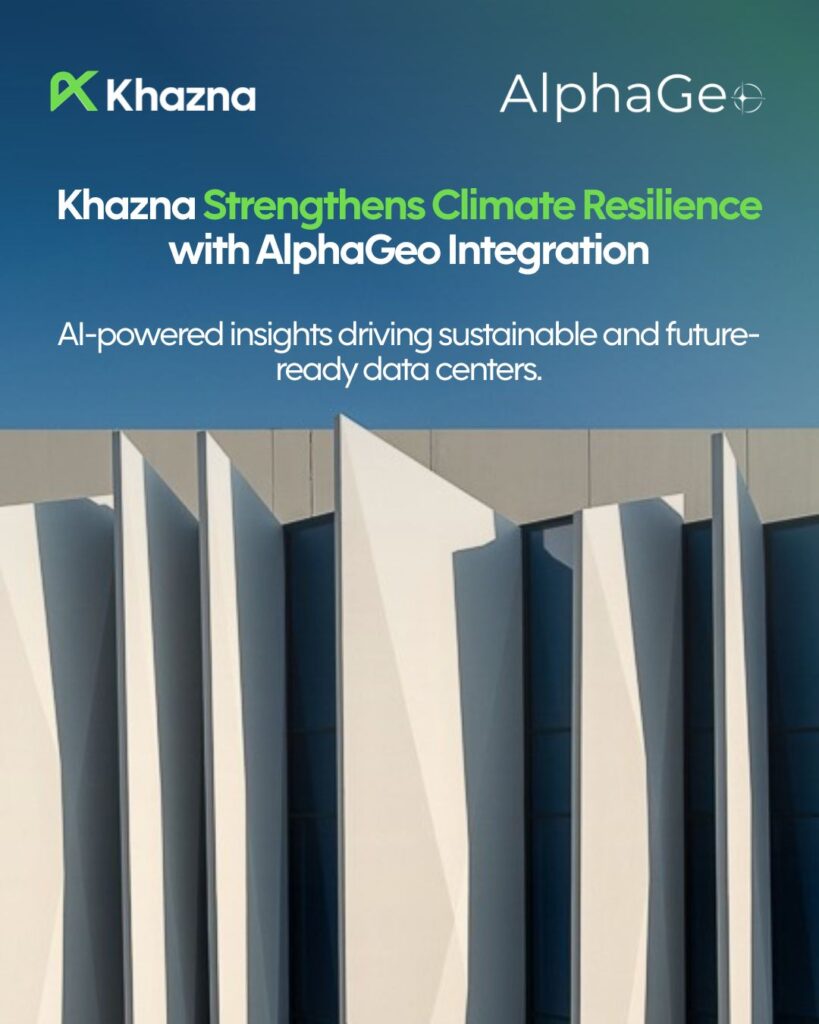case study
How Khazna Data Centers Builds Climate-Resilient Facilities Across The Region

Overview
As climate change accelerates, data center operators face a dual imperative: scale to meet surging digital demand while embedding resilience and sustainability into every aspect of infrastructure planning. For Khazna Data Centers, the largest platform of hyperscale data centers in the region, this means aligning operational growth with its ESG commitments and the UAE’s Net Zero 2050 agenda. Khazna turned to AlphaGeo, an advanced climate intelligence tool, to translate environmental data into strategic foresight, enhance cross-functional decision-making, and future-proof its portfolio against both physical and systemic climate risks.
“It’s very easy to over-engineer a software like this. Some tools were so complex only a couple of people in the organisation could understand them. You can have a Lamborghini, but if you don’t know how to drive it or turn it on, what’s the point? AlphaGeo is something that can be used in an organization like ours now, where not everybody is a climate expert or environmental engineer.”
Elisabetta Baronio, Senior Program Manager, ESG

Challenge
As the largest platform of hyperscale data centers in the region, Khazna operates a rapidly expanding, asset-intensive portfolio across diverse geographies. This scale brings significant responsibility – not only to deliver resilient digital infrastructure, but to do so sustainably.
In line with its ESG commitments and the UAE’s Net Zero 2050 agenda, Khazna has prioritized climate risk awareness and long-term environmental stewardship. Understanding how each facility might be affected by future climate scenarios, and translating that insight into actionable resilience planning, posed a growing challenge. The company needed a way to turn its sustainability goals into operational foresight, grounded in credible, forward-looking data.
Exposure of an Asset-Heavy Portfolio to Climate Risk
Khazna operates an asset-intensive business with infrastructure that must withstand long-term environmental changes. Climate change is no longer a distant risk but an active pressure point, presenting both chronic risks (for example, rising temperatures) and acute threats such as flash flooding. The challenge was to move from reactive risk monitoring to a proactive understanding of climate vulnerabilities across all sites.
“We have a lot of assets, and those assets are subjected to climate change. The more the climate changes, either due to drastic events or chronic shifts, the more our assets will come under stress,” says Elisabetta Baronio, Senior Program Manager – ESG, Khazna Data Centers.
Limitations of Historical Data and Siloed Risk Tools
The Khazna team previously relied on historical data sources, which were limited when it came to modelling forward-looking risks. Furthermore, climate risk assessments were often fragmented, requiring data from multiple platforms to gain a full picture. This made decision-making slow and overly reliant on specialists.
Overcomplexity of Existing Solutions
Vendors previously considered by the ESG team often delivered technically deep tools with steep learning curves, making them impractical for cross-functional collaboration. A core challenge was finding a solution that balanced depth with accessibility.
“It’s very easy to over-engineer a software like this. Some tools were so complex only a couple of people in the organisation could understand them,” explains Baronio. “You can have a Lamborghini, but if you don’t know how to drive it or turn it on, what’s the point?”
Solution
To address the growing complexity of climate-related risk across its operations, Khazna deployed AlphaGeo, a powerful yet accessible platform that transforms global climate data into site-specific insight.
Built on internationally recognized scenarios and multi-layered modelling, AlphaGeo enables Khazna to assess the environmental exposure of each facility, understand regional infrastructure resilience, and quantify long-term vulnerabilities in a single, unified view.
Crucially, it bridges the gap between technical depth and usability, making it possible for cross-functional teams, from engineering to finance, to engage directly with the data. In doing so, it has become a foundational tool in Khazna’s ESG execution strategy, ensuring that climate intelligence informs both operational and investment decisions.
Future-Focused Risk Intelligence
AlphaGeo uses IPCC climate scenarios and its own multi-source modelling to assess physical and systemic risks, giving the team a more complete picture of each site’s future exposure.
“It allows us to screen locations and understand what the exposure would be under different climate scenarios – like flooding if the temperature rises 3°C by 2040,” says Baronio. “They also analyse political response readiness, existing infrastructure, and model chronic and extreme events like flash floods or long-term temperature rise.”
The solution also struck the right balance between technical depth and user-friendliness, enabling non-experts in engineering and international teams to access and act on climate intelligence.
“It’s something that can be used in an organization like ours now, where not everybody is a climate expert or environmental engineer.” Baronio says.
Integrated View of Risk, Resilience, and Market Attractiveness
The platform includes data on infrastructure readiness (for example, desalination capacity), national resilience indicators like road quality and governance effectiveness, and digital infrastructure, offering Khazna a holistic view of risk and opportunity in new markets. This integrated view is vital as the company continues its international expansion.
Results
Since its rollout, AlphaGeo has become an integral part of Khazna’s planning and resilience framework. The Climate Risk and Resilience Scores and Financial Impact Analytics have been embedded into site selection processes, validated the readiness of certain facilities, and surfaced critical areas for improvement.
Beyond operational insights, the platform has catalyzed deeper collaboration across departments, aligning ESG goals with engineering design and financial planning. In a region where proactive climate risk analysis is still emerging, Khazna’s use of AlphaGeo reflects a mature, forward-thinking approach: one that turns environmental risk into informed strategy and reinforces the company’s leadership in sustainable digital infrastructure.
Embedded in Site Analysis Across the Business
Since April, Alpha Geo has been actively used in the screening of new sites to provide desktop analyses that inform engineering and site selection. It offers immediate insights into socioeconomic context and regional vulnerabilities, without requiring on-the-ground assessments upfront.
“We used it to assess a new region for a new project, and I was able to provide the relevant team with socio-economic and climate risk insights right away,” explains Baronio. “This is a critical first step for us – understanding what could happen so we can protect our assets to be more resilient in the future.”
Informed Resilience Planning and Design Adjustments
The tool has also revealed both strengths and vulnerabilities across the existing portfolio. It validated that some equipment is already capable of withstanding future temperature increases, offering a competitive advantage. It also exposed gaps, which sparked cross-functional discussions about long-term redundancy strategies.
“Some of our sites are ready to cope with future challenges, but we now know that, in others, we need to be more intentional about the equipment we use to withstand environmental changes, Baronio says.
Indeed, insights from AlphaGeo are being fed into engineering, operations, and finance teams to guide future-proof designs and quantify financial exposure to climate change. While the full financial modelling is still in progress, the platform is expected to support strategic planning across multiple business functions.
Demonstrating Leadership in a Region Where ESG Maturity Varies
Using Alpha Geo has put Khazna ahead of the curve in climate risk preparedness, particularly in regions where such assessments are not yet the norm. This proactive stance supports both ESG commitments and operational resilience.
“In this region, climate risk analysis is not something that’s usually done. The fact that we’ve screened all our facilities is a plus,” says Baronio. “It’s probably one of the best ways we have to deal with the issue – by understanding our weak points and being intentional about our resilience.”





